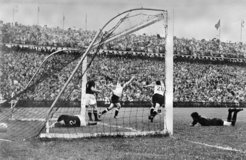Synchronizing Feelings

Shared Enthusiasm: Emotions in Football Clubs
Julia Wambach
Throughout the twentieth century the football club FC Schalke 04 repeatedly became involved in participatory politics, despite its allegedly apolitical nature as a leisure club. Governments, political parties, and local magistrates sought to use Schalke fans' emotional relationship with the club for their own ends. The club itself developed into a significant political player in its home city of Gelsenkirchen, North Rhine-Westphalia, during the crises of deindustrialization in the mid-1990s.
Collective Hoping: Sung Emotins in Political Youth Organisations
Juliane Brauer
How and why was communal singing one of the main community practices in youth organizations in the twentieth century? Singing specific songs, especially from the labour movement, made it possible to learn political emotions and attitudes. Singing in a community could convey desired values, attitudes and emotions and, ideally, synchronize them.
The history of the song Wann wir schreiten Seit an Seit (When we stride side by side, 1913), the most important song of the social democratic youth movement in the 1920s, adapted and modified by the Hitler Youth during the Nazi era, and later sung by youth organizations in both parts of Germany, shows how, in different contexts, the repeated singing of certain songs could establish political emotions such as hope for a better future.
